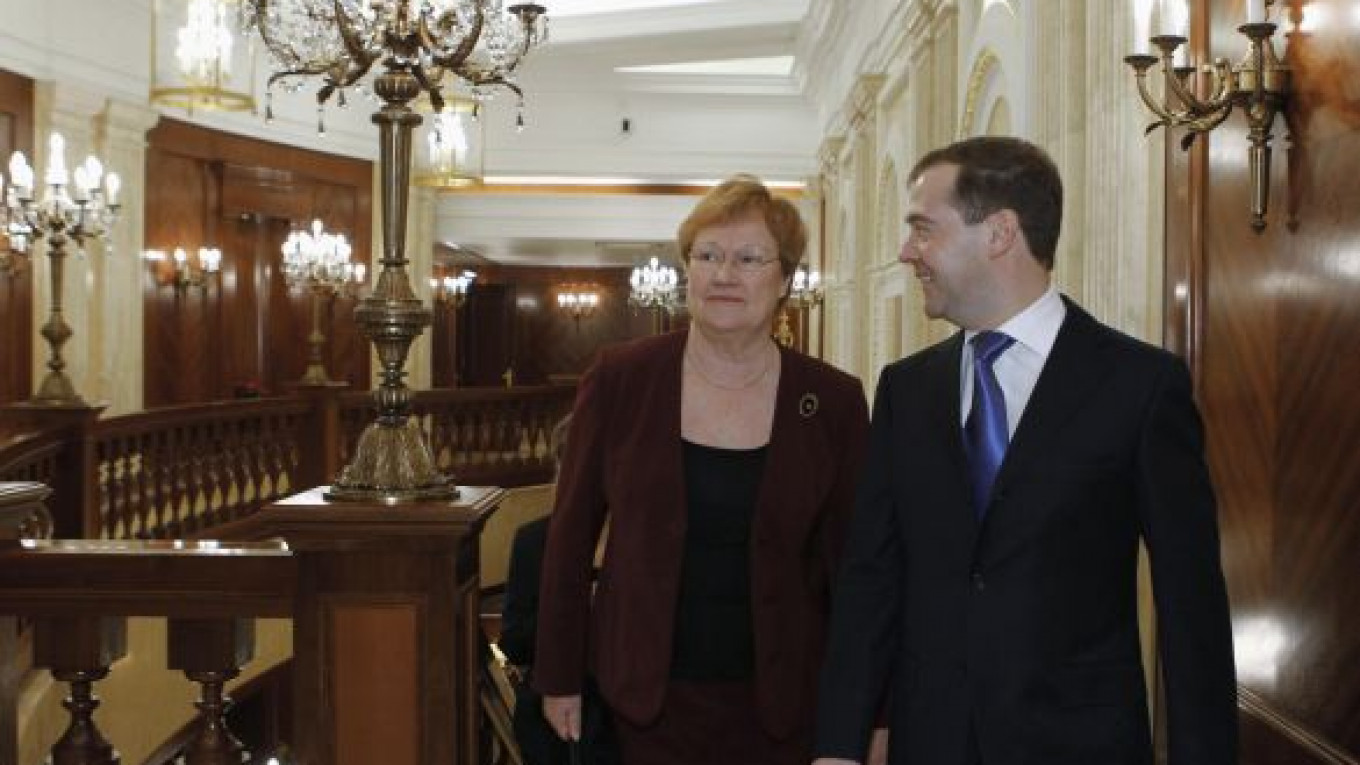Finnish businessmen said Tuesday that they expect economic relations between Russia and Finland to strengthen in the future regardless of who wins the race for the presidency in both countries, where elections are rapidly approaching.
President Dmitry Medvedev met with Finnish counterpart Tarja Halonen in his Gorki residence to discuss the results of the countries' cooperation, as both leaders prepare to leave their posts later this year.
Last year was very fruitful for Russian-Finnish cooperation, with bilateral trade reaching pre-crisis levels, "but there are … prospects for the future. I think we could discuss them, especially as our countries are facing important political events, I mean elections," Medvedev said, according to a transcript on the Kremlin web site.
Having served two six-year consecutive terms, Halonen can't run for the presidency in the elections to be held in Finland on Sunday. The country's former Finance Minister Sauli Niinisto is widely considered the front runner.
Despite upcoming changes in the countries' political life, Finnish businessmen in Moscow said the election outcome in both countries is unlikely to affect developing economic cooperation.
"I don't see why there should be any changes," said Mirja Tiri, chief executive of the Finnish-Russian Chamber of Commerce.
The countries' economic cooperation has significantly evolved over the last two decades. "It's not simply exporting goods from one country to the other, it's much more varied," she said by telephone.
Jukka Kylmala, head of the power business division in Russia and CIS at Metso, a supplier of technologies for mining, construction, oil and gas and other industries, echoed this thought, saying he expects more new orders from Russia.
Despite problems like bureaucratic barriers in Russia, he said he's positive about the prospects of mutual cooperation.
"Russia is very interested in new technologies, and Finland has know-how and knows how to do business in Russia," he said by telephone.
Exports to Finland reached 9.4 billion euros ($11.8 billion) in October, a 26 percent increase from the same month last year, with the oil and gas industry contributing about 80 percent of this amount, Tiri said.
Imports from Finland increased 12 percent to reach 4 billion euros in October.
Bilateral trade reached $15.7 billion for the period January through October last year, representing 19.8 percent growth compared with the same period in 2010, the Kremlin said in an e-mailed statement ahead of Halonen's visit.
The size of Finnish investment in Russia has increased over the last 10 years and hit $3.4 billion as of September, the statement said.
Among the priority industries for cooperation are shipbuilding, energy, transportation and forestry, it said.
"Trade and economic relations between Russia and Finland have a long history based not on political factors but on strong mutual commercial interest," said Fyodor Lukyanov, editor-in-chief of the Russia in Global Affairs magazine.
Unlike former German Chancellor Gerhard Schröder and former head of the Italian cabinet Silvio Berlusconi — widely known as Prime Minister Vladimir Putin's good friends — who strengthened relations with Russia using "political curtseys," Halonen has always been rather critical about Russia's policy, he said by telephone, adding, however, that this hasn't affected the two countries' economic relations.
"So any changes are unlikely regardless of who becomes the next president," Lukyanov said.
What is likely to bring positive changes for Finnish companies operating in Russia is its accession to the World Trade Organization.
"Finnish businessmen were eager to see Russia in the WTO in order to have an additional guarantee that their investment will be safe," Lukyanov said.
Halonen also visited Putin's Novo-Ogaryovo residence later Tuesday. In an informal conversation, Putin proposed that the Finnish president buy real estate in Russia.
"They say many Finns would like to acquire real estate in Russia. Maybe you could show the way and buy something?" Putin asked.
"Agreed," Halonen replied in Russian.
A Message from The Moscow Times:
Dear readers,
We are facing unprecedented challenges. Russia's Prosecutor General's Office has designated The Moscow Times as an "undesirable" organization, criminalizing our work and putting our staff at risk of prosecution. This follows our earlier unjust labeling as a "foreign agent."
These actions are direct attempts to silence independent journalism in Russia. The authorities claim our work "discredits the decisions of the Russian leadership." We see things differently: we strive to provide accurate, unbiased reporting on Russia.
We, the journalists of The Moscow Times, refuse to be silenced. But to continue our work, we need your help.
Your support, no matter how small, makes a world of difference. If you can, please support us monthly starting from just $2. It's quick to set up, and every contribution makes a significant impact.
By supporting The Moscow Times, you're defending open, independent journalism in the face of repression. Thank you for standing with us.
Remind me later.






